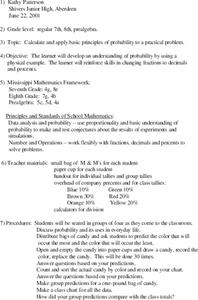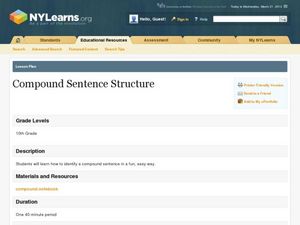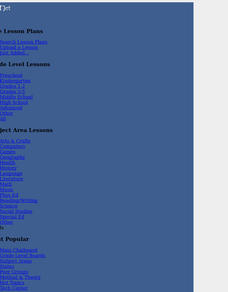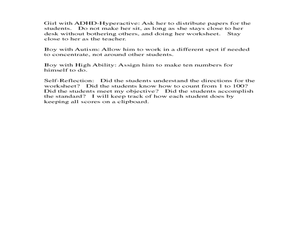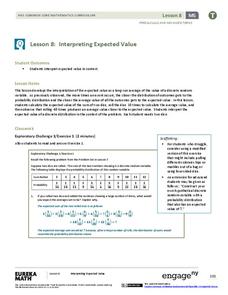Curated OER
Buggin' Out (Identifying and Adding Amounts of Money)
Students explore consumer math by participating in estimate exercises. In this currency lesson, students identify and define each piece of U.S. currency and their value to the monetary system. Students complete several money worksheets...
Curated OER
Put Patterns to Work for You!
In this patterns worksheet, students complete multiplication charts and division problems to solve pattern problems. Students complete 11 problems total.
Curated OER
Using Adjectives to Write
Fifth graders examine how to write a story using comparative and superlative adjectives. They listen to the book "Pig Pigger Piggest" by Rick Walton and identify the comparative adjectives used in the story. Students then write a rough...
Curated OER
Introduction to Calculus
Twelfth graders discuss attitude necessary to be successful in calculus. For this calculus lesson, 12th graders review famous quotes about success to help them get motivated to learn and be successful in the classroom. This assignment...
Curated OER
Going to St. Ives
In this algebra worksheet, students answer a riddle that is meant to make them focus on what the question is really asking them to do. There is an answer key with this riddle.
Pennsylvania Department of Education
Shapes Around Us
Learners use manipulatives to study shapes. They sort shapes and use correct geometric terminology to describe them. Students find real-life examples of 2 and 3 dimensional shapes, and classify figures in their classroom according to...
Curated OER
Problems Using Time
What time will it be in thirty minutes? Scholars use three digital clocks to answer nine questions which require they add and subtract minutes from a given time. Learners record what time it will be in a specific number of minutes or...
Curated OER
Make it Easier-- Add, then Take
In this math worksheet, students learn a mental math strategy in addition called compensation. When adding a number such as 29, students learn to add 30, then take 1 away. Students solve 25 problems in which they round to the nearest...
Curated OER
Probability using M & M's
Using M & M's candies, young statisticians predict the color distribution in a packet of candies and test their predictions against their group and the larger class. A review of converting between fractions, decimals, and percents...
Bright Hub Education
Math Lesson for Visually Impaired Early Learners: A 3 Way Counting Activity
A unique lesson that's designed for visually impaired early learners, but can be adapted for anyone, is here for you. Pupils use brightly colored foam letters, beads, checkers, and an abacus, in order to gain practice in identifying the...
Curated OER
Compound Sentence Structure
SMART boards a great way to create interest in any subject - even grammar! Using the provided SMART board lesson plan, have your 10th graders come up to the board and combine two independent clauses using a "glue" word (coordinating...
Curated OER
ALARA
This activity sheet posts a chart of the common radiation sources in our everyday lives. Chemistry scholars use it to analyze their own radiation exposure using rem (Roentgen equivalent for man) units. This simple assignment increases...
Teachers.net
Chicka-Chicka-Boom-Boom/ Chicka Challenge (Elementary, Literature)
Is your Kindergarten class about to read the book, Chicka-Chicka-Boom-Boom? If they are, and you want a few wonderful activity ideas to reinforce phonemic awareness and letter identification skills, look no further. Here you'll find over...
Curated OER
Adding up the Pizza
Although not the best in terms of grammar, this addition word problem will work just fine as a guided warm-up. Because the explanation is at the bottom of the page, project this for the class, having learners do it independently, then...
Curated OER
Relate Counting to Addition and Subtraction
Find 10 simple word problems that require addition and subtraction skills. Although these offer clear math procedure, the grammar isn't perfect. The highest number your learners encounter here is 40, and each question has room for...
Curated OER
Adding and Subtracting
Students will add and subtract numbers less than 100 as well as understand and use the inverse relationship between addition and subtraction. They compose/decompose numbers up to 10 and understand a variety of situations in which...
Curated OER
Problem Solving Patterns
In this problem solving patterns worksheet, 6th graders solve and complete 2 various types of problems. First, they identify what the 4n represents in each block pattern illustrated. Then, students determine the number of arrows added to...
Curated OER
Got These Properties? (Commutative in Addition/Zero in Addition and Subtraction)
Second graders examine the commutative property of addition and the property of zero in addition and subtraction. They complete an asessment worksheet to gain practice reading and working number sentences horizontally and vertically.
Curated OER
Name that Number
First graders state numbers from 1 to 100. In this name that number lesson, 1st graders must identify and state 10 random numbers given on a worksheet.
Curated OER
Number Patterns: Triangular & Square Numbers
Learners explore the patterns found in triangular and square numbers. In this number pattern activity, students complete a worksheet exploring the relationship between triangular numbers and square numbers.
Math Salamanders Ltd.
Adding 1s, 10s, 100s, and 1000s
In this addition activity, students complete a 13-row chart. They start with three or four-digit numbers and add 1, 10, 100, or 1000 to each number to fill in the chart. The last four questions require subtraction because the initial...
Math Mammoth
Grade 1 Worktext
Use graphing, counting, and number lines to help first graders learn about addition and subtraction. An array of worksheets and activities are an excellent resource for your math lesson, whether you are focusing on counting skills...
EngageNY
Scientific Notation
Young mathematicians learn how scientific notation is meant to save time. Part 10, out of a series of 15, asks scholars to recognize the correct use of scientific notation and finish by adding and subtracting numbers using...
EngageNY
Interpreting Expected Value
Investigate expected value as a long-run average. The eighth installment of a 21-part module has scholars rolling pairs of dice to determine the average sum. They find aggregate data by working in groups and interpret expected value as...








